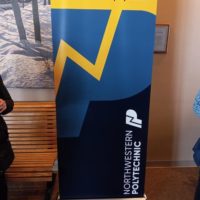
Courtesy: Northwestern Polytechnique
Northwestern Polytechnic Receives $1M for Applied Agriculture Research
National Bee Diagnostic Centre spreading its wings to explore entrepreneurial agriculture.
October 14, 2022, Grande Prairie, Alberta – Northwestern Polytechnic (NWP) has been awarded a $1 million grant over
the next five years to support regenerative agriculture.
Funded by the Natural Sciences and Engineering Research Council of Canada (NSERC), the project will be led by NWP’s
National Bee Diagnostic Centre (NBDC) in Beaverlodge, Alberta.
“This is great news for our talented researchers and surrounding agricultural communities,” said Provost and Vice
President Academic, Dr. Vanessa Sheane. “NBDC’s diagnostic services for honeybee pests, pathogens, and parasites are
recognized across Canada but there is vast potential for even more discoveries in our agriculture and forestry sectors.
We are delighted to be expanding our portfolio with the help of this federal funding.”
The polytechnic’s new five-year applied research project will focus on soil health as it aims to create a producer-led,
collaborative research and knowledge extension network that can connect growers in the Peace Region. Project
directors Dr. Gail MacInnis and Patricia Wolf Veiga will work with their research team to develop a regenerative
agriculture research and education program to enhance sustainable production on northern farms.
“Our entrepreneurial producers in the Peace have been using regenerative agricultural practices without using the
specific terminology,” said Wolf Veiga. “Other producers may be curious but lack the knowledge or experience they
need to get started. I think that’s where our project can help fill some gaps.”
Regenerative agriculture is a practice that promotes soil health while maintaining profitable production. This type of
farming focuses on reduced tillage, rotational grazing, and cover cropping to improve soil health and efficiency. These
practices can enhance farm production, biodiversity, and resilience to climate change.
Along with bringing researchers and producers together, NWP’s project will involve collaboration with Peace Region
Forage and Seed Association, Saskatchewan Alfalfa Seed Producers Development Commission, Alberta Biodiversity
Monitoring Institute, the University of Montreal Biodiversity Collection, Parkland College, the Peace Country Beef and
Forage Association.
“This initiative fits well with our strategy to expand NBDC’s scope beyond just bees,” said Wolf Veiga. “We have a
specialized facility with equipment, technology and expertise that can be used for other applications besides pollinators,
such as soil, water, crop and animal health. We will also continue to nurture our research with pollinator health.”
Another major component of this research is its potential to facilitate applied learning opportunities for NWP students
from a range of disciplines. Students engaged in this project will gain real world research experience, lead their own
projects, and develop skills in consultation and knowledge extension.
“This is true applied research,” said Dr. MacInnis. “We’re not hiding away in a lab. We’re taking a practitioner-driven
approach, working directly with the farmers to unearth challenges, and formulate strategies to help.”
To learn more about NWP’s National Bee Diagnostic Centre please visit NWP.me/NBDC.
About NWP
Northwestern Polytechnic (formerly Grande Prairie Regional College) reflects the entrepreneurial energy of the region it
represents. Established as a college more than five decades ago, the institution received its polytechnic designation in
2021. With campuses in Grande Prairie and Fairview, the institution serves students from across Alberta, Canada and the
world. Students pursue a wide variety of academic programs ranging from certificates and diplomas to degrees. For
more information visit us at nwpolytech.ca.




